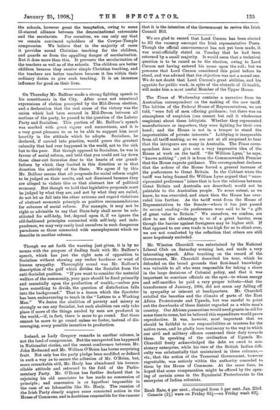The Times of Wednesday contains a narrative from its Australian
correspondent on the making of the new tariff. The lobbies of the Federal House of Representatives, we are told, "were full of men offering guidance ; but there was an atmosphere of suspicion (one cannot but call it wholesome suspicion) about these lobbyists. Whether they represented manufacturers or importers, they were fighting for their own hand ; and the House is not in a temper to stand the importunities of private interests." Lobbying is inseparable from all tariff-making, so we are not at all surprised to hear that the intriguers are many in Australia. The Times corre- spondent does not give one a very impressive idea of the House at work on the tariff. "Sir William Lyne," he says, "knows nothing " ; yet it is from the Commonwealth Premier that the House expects guidance. The correspondent declares that the ardour of the House forced a general increase of the preferences to Great Britain. In the Cabinet when the tariff was being framed Sir William Lyne argued that " unre- ciprocated preference" (since that is how the relations between Great Britain and Australia are described) would not be palatable to the Australian people. To some extent, as we know, he was overruled, and since then the House has over- ruled him further. As the tariff went from the House of Representatives to the Senate—where it has just passed its second reading—its preferences were said to be "a gift of great value to Britain." We ourselves, we confess, are slow to see the advantage to us of a great barrier, even though the barrier against foreigners may be higher still. If that opposed to our own trade is too high for us to climb over, we are not comforted by the reflection that others are still more hopelessly excluded.




















































 Previous page
Previous page